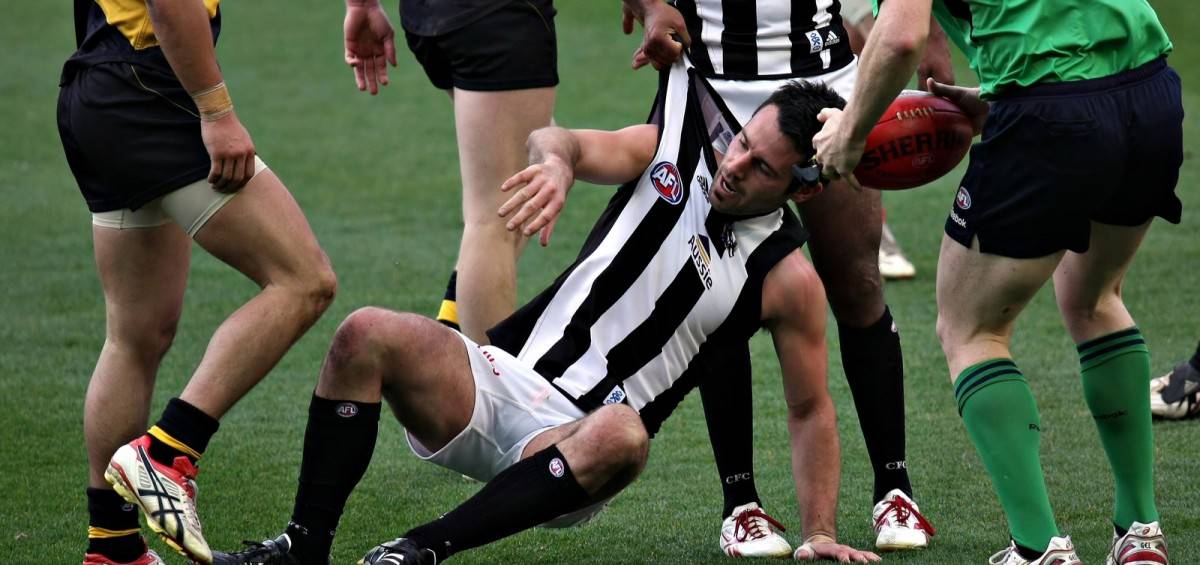
Concussion In Sport
Put your mind at ease – Learn the concussion symptoms and how to manage them
On the back of the Fight MND campaign and the attention it has received, now is the right time to highlight the ever growing concern surrounding concussion in sport and furthermore brain health in general.
Athletes and sports players of all levels and ability are at risk. Typically concussion signs and symptoms resolve themselves within 10-14 days of the injury, however the possible long term effects of concussion and recurrent concussions are what medical professionals are concerned about.
What is Concussion?
Concussion is a brain injury and is defined as a complex physiological process affecting the brain, induced by biomechanical forces. It may be caused by either a direct or indirect blow to the head, face, neck or body causing an impulsive force transmitted to the head. – Sports Medicine Australia, 2017
Concussion Statistics in Australia
At the conclusion of the 2016 AFL season a damning statistic emerged – Concussions in the AFL had increased 10 times and the amount of games missed had increased by 14 times the 2006 number.
Number of matches missed per club due to concussion (where the player missed a game)
2006 – 0.3
2016 – 4.2
The AFL says the jump in cases is a result of greater precaution being taken in the reporting, diagnosis and treatment of concussion. While this may prove to be true, it says a lot about how Concussion has been diagnosed in the past and the lasting affect it may have on players from a bygone era.
Past player Greg Williams has been very vocal about the lasting effects concussion has had on him and is calling for more to be done about the injury.
Chronic Traumatic Encephalopathy (CTE)
CTE is a degenerative brain disease, found commonly in people who have suffered repeated blows to the head.
In 2002 Nigerian neuropathologist Dr. Bennet Omalu worked on the case of American football player Mike Webster, who had died following unusual and unexplained behavior. Later in 2005 Omalu after a long battle with the NFL (National Football League), published his findings in the journal Neurosurgery in a paper which he titled “Chronic Traumatic Encephalopathy in a National Football League Player.”
Symptoms of CTE usually begin 8-10 years after a person has experienced repetitive, mild traumatic brain injury. Headaches, dizziness and loss of balance are followed by Memory loss, disorientation and abrupt mood swings. The next phase is progressive dementia, movement disorders, hypomimia, speech impediments and tremors
The 2015 movie Concussion chronicles Dr. Omalu’s trials and tribulations (Will Smith) and acts as a fantastic case study. Great viewing for anyone wanting to find out more!
What is Being Done in Australia?
Given the increased awareness in the last 5-10 years, Concussion is now treated with the respect it deserves.
The AFL being one of the biggest sporting bodies in Australia has taken a hard line stance on Concussion in recent years, with a cautious approach now being taken with all cases. A standardized concussion recognition tool is used to diagnose concussion immediately. If a player fails the concussion test, they are not permitted to go back on the field of play.
Complications
- Higher risk of injury or repeated concussion on return to play
- Prolonged symptoms (lasting more than 14 days)
- Depression and other mental health issues
- Severe brain swelling (particularly in young players)
- Long term damage to brain function
These complications have been thrust into the spotlight in recent years more so than ever, particularly with the findings on CTE. Professional sports players with a history of repeat concussions now have to carefully consider their playing future, taking into account livelihood in later life.
Concussion in Kids – How Parents Can Put Their Mind at Ease
The thought of your child suffering some form of head trauma is enough for most parents to not risk it at all. However the thought of not letting children be active and outdoors is also a little upsetting. Here are some tips and tricks to find a happy medium, whilst understanding all there is to know about concussion
Prevention techniques
- Play by the rules
- Learn the proper techniques
- Be very, very well informed on concussion
Treatment
Treatment starts by being extremely well informed, knowing the symptoms and how to handle them. If the signs and symptoms are present a doctor should be contacted immediately.
As a general rule of thumb and particularly for children, you should not play any sport for 2 weeks. Recovery time is generally between 10-14 days.
A doctor should always be contacted if signs and symptoms of Concussion are present. If you would like to find out more or to book an appointment contact us on (03) 9470 1010.



